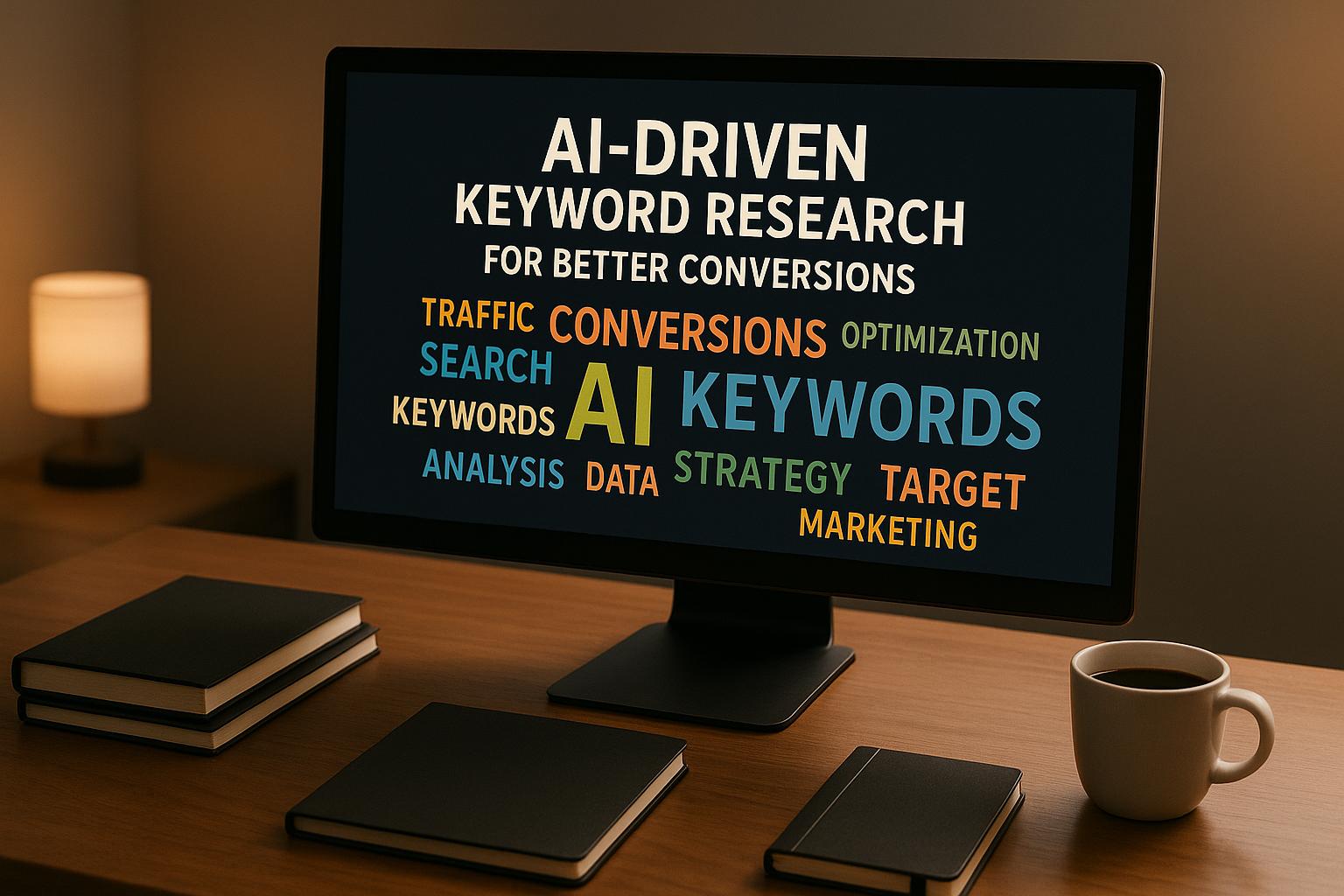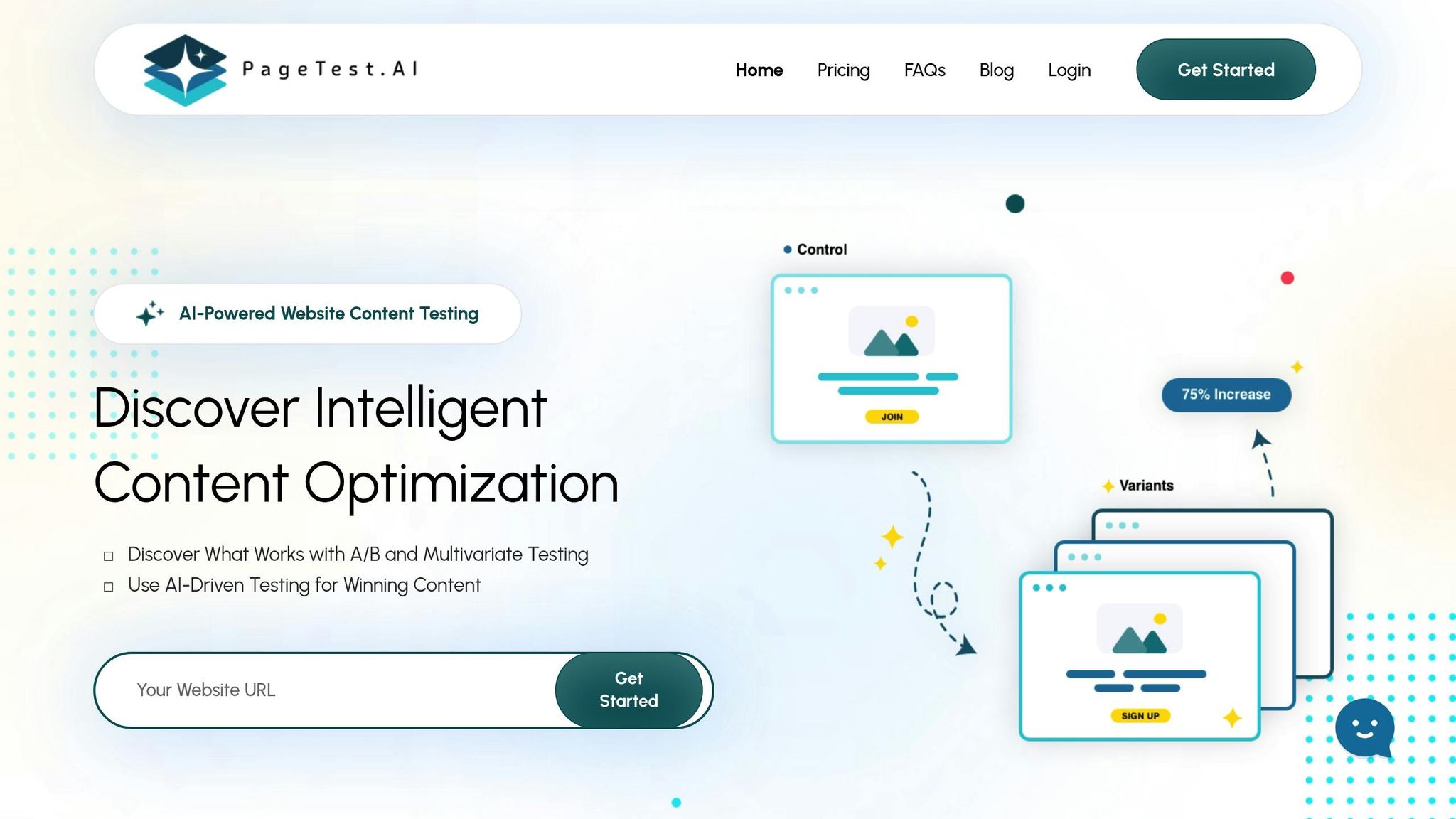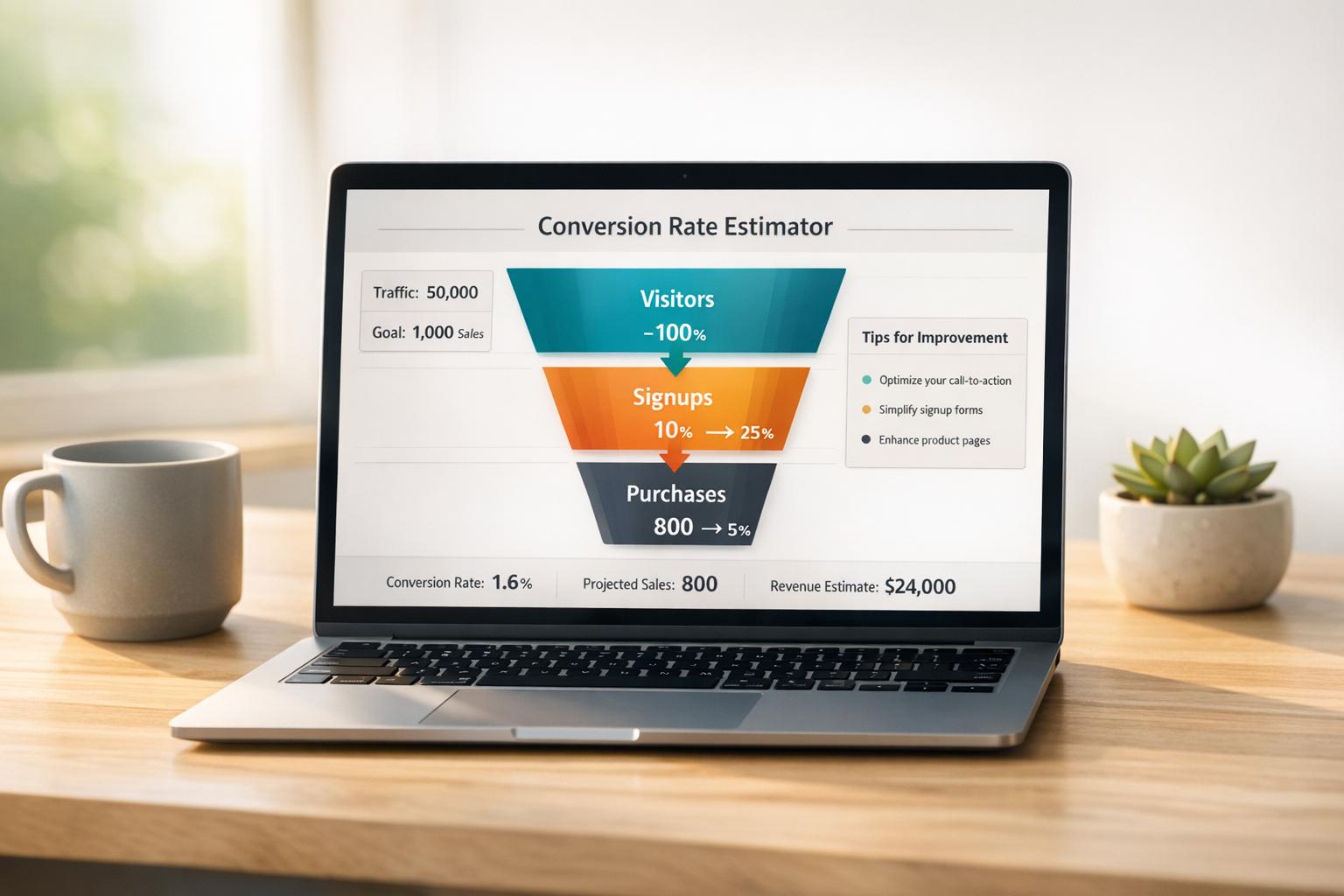

AI-Driven Keyword Research for Better Conversions

AI-Driven Keyword Research for Better Conversions
 18-07-2025 (Last modified: 28-07-2025)
18-07-2025 (Last modified: 28-07-2025)
AI is reshaping keyword research, making it faster, more precise, and focused on driving conversions.
Here’s what you need to know:
- AI tools analyze massive datasets to identify high-converting keywords, predict trends, and understand user intent.
- Conversion-focused keywords (like long-tail phrases) outperform traffic-heavy ones, delivering more qualified leads and better ROI.
- AI improves efficiency and accuracy, saving marketers hours by automating tasks like grouping keywords by intent or optimizing content.
- Tools like Semrush, Ahrefs, and Surfer SEO simplify keyword research, content creation, and competitor analysis.
- AI platforms like PageTest.AI boost conversions by testing and optimizing content elements like CTAs and headlines.
AI doesn’t just find keywords – it helps you target the right audience, align with search intent, and continuously improve your strategy for better results. Let’s dig into how this works.
AI + Traditional KEYWORD RESEARCH COURSE (2025) | Ultimate Keyword Research With Checklist & Prompts
AI Tools for Keyword Research and Optimization
The way we approach keyword research has evolved dramatically with the rise of AI-powered tools. These tools don’t just simplify the process – they bring a level of precision and insight that manual methods can’t match. By combining machine learning with vast datasets, AI tools help uncover keyword opportunities, interpret user intent, and fine-tune content to drive conversions.
AI-Powered Keyword Research Tools Overview
Modern AI tools for keyword research go well beyond providing basic search volume metrics. They deliver real-time updates by continuously scanning search engines for the latest trends and offering tailored recommendations based on your industry and audience. The best tools integrate multiple AI capabilities to craft detailed keyword strategies.
- ChatGPT: This tool generates fresh keyword ideas through its conversational interface, making it particularly useful for exploring how users phrase queries. For instance, instead of a generic search like "keywords about shoes", you can try something more specific, such as "long-tail keywords for waterproof hiking boots under $200".
- Semrush: Known for its comprehensive features, Semrush provides detailed keyword analysis, competitor insights, and content optimization tools, making it one of the most versatile platforms.
- Ahrefs: This platform excels at identifying keyword gaps, analyzing backlinks, and tracking keyword difficulty trends. Its extensive database supports ongoing monitoring across various search engines.
- Moz Pro: Moz focuses on local SEO and competitive keyword mapping, offering tools for domain authority analysis and geographic targeting – ideal for businesses with a regional focus.
- Surfer SEO: This tool integrates keyword research directly into the content creation process. It offers real-time suggestions for keyword density, content structure, and related terms while analyzing top-ranking pages for optimization insights.
The impact of these tools is clear: 84% of marketers report that AI helps align web content with user search intent, and 52% say it improves speed and efficiency. By analyzing published content across the web, these platforms provide a reliable snapshot of actual search behavior.
Once keywords are identified, the next step is validating them to ensure they lead to meaningful conversions.
How to Validate Keywords with AI and SEO Platforms
Finding keywords is just the beginning – validation is where you separate potential winners from the rest. AI tools excel at this by analyzing user intent, suggesting content ideas based on high-performing keywords, and providing real-time recommendations to improve relevance. Start by using these tools to identify opportunities and create content briefs tailored to your audience. They can assess search trends, user behavior, and competitor strategies to highlight keywords with strong conversion potential.
For example, Writesonic’s Chatsonic SEO AI helped a company boost organic traffic by 65% in just three months. It moved their keyword rankings from page 3 to page 1 while saving 7–10 hours of SEO work per week. Nearly a third of marketers now rely on AI for content ideation and SEO, showing how these tools enhance productivity and results.
AI also simplifies data analysis, spotting patterns like seasonal trends or emerging topics before they gain traction. To get the most out of these tools, invest time in training your team to use them effectively.
"AI has leveled the playing field for scrappy, tech-aware businesses. This only elevates the competitive nature of your market. If you aren’t using AI in your daily strategy, you risk falling behind within the next 12-18 months." – Dan Shaffer, Director, SEO.com
AI works best as a teammate, not a replacement. The most successful strategies blend AI’s insights with human creativity and strategic thinking. Start small, test the tools on limited projects, and always ensure your efforts align with SEO best practices and your brand’s goals.
With validated keywords in hand, it’s time to focus on turning those insights into conversions using platforms like PageTest.AI.
Using PageTest.AI for Conversion Optimization

Keyword research identifies opportunities, but conversion optimization turns those opportunities into tangible results. PageTest.AI bridges this gap by refining website content – headlines, CTAs, product descriptions – using AI-driven insights to boost conversion rates.
What sets PageTest.AI apart is its ability to test multiple content variations simultaneously. Unlike traditional A/B testing, which focuses on one element at a time, this platform uses multivariate testing to evaluate multiple factors – like headlines, CTAs, and design elements – all at once.
For e-commerce businesses, this means experimenting with product descriptions to find what resonates most, adjusting button colors and placements to increase clicks, and optimizing checkout processes for a smoother user experience. Growth marketers can use PageTest.AI to refine landing pages, tweak ad creatives, and personalize messaging for better results.
The platform’s ease of use is another advantage. Its Chrome extension and low-code/no-code setup make it accessible, even for teams without advanced technical skills. Plus, it integrates seamlessly with tools like Google Analytics, offering real-time feedback on content performance and creating a complete loop from keyword research to conversion measurement [24–27].
AI-Driven Keyword Optimization Strategies
Building on the foundational keywords and conversion insights we’ve covered earlier, AI takes optimization to the next level. It doesn’t just identify keywords – it reshapes how we think about keyword strategies by revealing opportunities that traditional methods often overlook. The focus here is on generating high-converting keywords, understanding user intent, and strategically mapping content to maximize its potential.
Generating Keyword Ideas with AI
AI-powered keyword tools use machine learning to analyze huge datasets and predict terms that align closely with user intent. The results are impressive: AI-generated keywords can produce 53% more unique queries compared to conventional tools, with 2.3x higher average search volumes and 4.1x better conversion rates due to their precise intent alignment.
One of AI’s standout features is its ability to uncover niche long-tail keywords. These often have 37% less competition, making it easier to rank for them.
To get the most out of AI, it’s important to craft detailed prompts. For instance, instead of a generic request like "fitness keywords", try something more specific:
"List 15 low-competition keywords for home workout equipment under $200, targeting busy professionals who want quick results."
AI can also identify conversational queries and emerging trends that traditional tools might miss. By asking AI to pinpoint problems your audience faces and how they might search for solutions, you can discover the exact phrases potential customers use when they’re ready to buy.
Unlike static databases used by traditional tools, AI keyword generators adapt in real time to changes in search engine algorithms. This flexibility keeps your keyword strategies current and competitive. Next, let’s explore how AI helps decode user intent.
Understanding User Intent with AI
Once keywords are generated, AI refines your strategy by analyzing user intent. This goes far beyond simply matching keywords to content. Understanding what users are really searching for is critical – especially since, in 2024, 60% of Google searches resulted in users not clicking beyond the search engine results page.
AI categorizes search intent into three main types: informational (seeking knowledge), navigational (looking for specific websites), and transactional (ready to buy). Aligning your content with these intents significantly boosts its ability to convert.
The search landscape has evolved with AI’s influence. By June 2025, 57% of Search Engine Results Pages (SERPs) included AI-generated overviews. To stay competitive, optimize content for AI understanding. Focus on conversational, long-tail keywords that reflect natural language, which also improves voice search performance. For example, instead of targeting "best running shoes", aim for something like:
"What are the best running shoes for flat feet under $150?"
AI now prioritizes E-E-A-T (Experience, Expertise, Authoritativeness, and Trustworthiness) when ranking content. To align with this, your content should present clear expertise and factual details. For instance, instead of saying, "We think this product is great", state:
"This product received a 4.8-star rating from 2,500 verified customers over six months."
Mapping Keywords to Optimize Content
Keyword mapping is the process of assigning keywords to specific pages and identifying content gaps that could drive conversions. AI streamlines this by prioritizing topics systematically based on search volume, intent, and relevance.
AI tools can analyze whether a keyword deserves a dedicated page or should be integrated into existing content. Mapping keywords along the customer journey – whether at the top, middle, or bottom of the funnel – ensures your content aligns with user behavior and search patterns.
To guide content creation, AI generates detailed briefs that include primary keywords, subtopics, and related questions designed to match user intent. These briefs help you create content that meets your audience’s needs at every stage of the buying process. The results speak for themselves: one user of Surfer SEO saw their content jump from #7 to #1 overnight simply by following an AI suggestion to cut 22,000 words from a 26,000-word article.
Organize your content using hubs, categories, or sub-domains based on topics. AI can also identify internal and external linking opportunities to improve authority and depth. By analyzing customer behavior, AI recommends the most effective keywords for each content piece. This ensures your keyword mapping reflects real user preferences rather than assumptions.
"I believe generative AI will positively impact multilingual, international SEO. Its ability to translate through natural communication is much faster. It cannot translate large amounts of data yet, but it will get there." – Matt Smith, SEO Expert
Keyword mapping isn’t a one-time task. AI tools continuously monitor performance and suggest updates based on shifts in search patterns and user behavior. This ongoing approach ensures your content stays aligned with user needs and drives conversions effectively.
sbb-itb-6e49fcd
Connecting AI Keyword Research with Conversion Optimization
AI-powered keyword research proves its worth when it directly enhances conversion rates. By analyzing historical data, building customer personas, and refining keyword strategies based on real-world performance, AI bridges the gap between research and actionable website improvements. This seamless connection transforms keyword insights into measurable results, showing how AI-driven research can lead to tangible conversion gains.
"AI doesn’t just help businesses understand what keywords are working today – it helps them anticipate what keywords will drive traffic tomorrow." – Ciaran Connolly, Director of ProfileTree
Optimizing Content Elements for Conversions
Once AI tools identify keywords with high conversion potential, the next step is to fine-tune content elements to match user intent. These tools can optimize headlines, calls-to-action (CTAs), and visuals, which are key to driving engagement and boosting conversions. The results speak for themselves: 30% of businesses using AI for content optimization reported a 6-10% revenue increase.
AI’s ability to refine content goes beyond surface-level changes. For instance, it can rewrite headings to be more engaging, create SEO-friendly alt text for images, and pinpoint the most effective anchor text. A standout example is Outranking, an AI SEO tool that helped a blog achieve a 1000% increase in clicks. By leveraging AI’s prompt-writing feature to produce three impactful articles per week, they streamlined content creation while significantly improving performance.
"Aligning with questions is something product builders should already do… Questions allow people to build trust for products/services, as well as safety, and sometimes answer a doubt that is critical to their conversion." – Riccardo Buzzotta, Co-founder of ContentRadar
A/B and Multivariate Testing for Content
AI-powered testing platforms revolutionize how marketers validate keyword-driven content changes. Unlike traditional A/B testing, AI enables continuous testing and optimization across multiple elements simultaneously, saving time and resources. For example, Evolv AI allowed a company to conduct six years’ worth of experiments in just three months.
Tools like PageTest.AI exemplify this approach by offering advanced A/B and multivariate testing designed specifically for content optimization. Beyond simple comparisons, AI can analyze heat maps to identify high-traffic areas on a website and suggest targeted tests. It also segments users based on behavior, uses predictive analytics to forecast responses, and recommends tailored experiments. Businesses using AI-driven personalization tools have seen an average 23% increase in conversions, with personalized CTAs performing 202% better than generic ones.
Tracking Conversion-Focused Metrics
AI simplifies data tracking by automating the analysis of metrics like engagement, time on page, and scroll depth, enabling real-time adjustments that maximize conversions. The focus lies on identifying which metric matters most – whether it’s sign-ups, subscriptions, checkouts, or lifetime value versus acquisition cost.
Once optimal content variations are identified through testing, AI ensures these improvements translate into measurable outcomes. It monitors performance in real time, adjusts strategies as needed, and automatically allocates traffic to the best-performing variations. This real-time optimization eliminates the need for constant manual oversight. For instance, AI-driven personalization contributed to a rise in the global eCommerce conversion rate from 3.21% in 2024 to 3.34% in 2025.
By shortening test cycles and boosting efficiency, AI enhances every aspect of conversion rate optimization. Combining predictive and generative AI allows businesses to create hyper-personalized experiences based on user behavior and first-party data, ensuring keyword research insights lead to real-world results.
"Sprig uses AI to analyze the Survey responses and Replay recordings to surface product issues and opportunities in real time. This saves product teams hours spent manually collecting and analyzing experience data." – Ryan Glasgow, Founder & CEO of Sprig
Measuring Results and Continuous Improvement
AI-powered keyword research only proves its value when its impact on conversions is measured and strategies are regularly fine-tuned. Without proper tracking, even the most advanced AI tools are just educated guesses. Smart businesses know that measuring results isn’t a one-and-done task – it’s a continuous process that fuels long-term growth.
Tracking Performance with AI-Powered Analytics
AI analytics is changing how marketers monitor keyword performance by automating data analysis and providing real-time insights. Unlike traditional analytics, which rely on manual interpretation, AI can process massive amounts of data – including live and streaming sources – to uncover patterns and inconsistencies that might otherwise go unnoticed.
These tools simplify tasks like data cleaning, integration, and transformation, delivering high-quality insights while freeing up time for creative and strategic work.
For conversion-focused strategies, AI analytics can track multiple metrics at once. Key performance indicators (KPIs) such as organic search conversions are essential. Engagement metrics – like average engagement time, sessions per user, and engagement per session – offer a deeper look at the quality of traffic your keywords generate.
Case studies highlight how AI analytics can transform raw data, such as call insights and appointment volumes, into actionable marketing strategies. However, many marketers struggle with incomplete data. Without comprehensive tracking systems, they may miss over 50% of the conversions they drive. AI analytics addresses this by identifying outliers in datasets, flagging potential errors, fraud, or emerging trends.
These real-time insights allow for clear comparisons between strategies, helping businesses make informed decisions.
Using Comparison Tables to Evaluate Strategies
Once you have the data, structured comparisons can help pinpoint which keyword strategies deliver the best results. Focus on metrics that align with your business goals, and tailor KPIs to objectives like sales, lead generation, downloads, or form submissions. For example, comparing cost per acquisition across channels can reveal how effectively you’re using your marketing budget.
Brand impact metrics, such as impressions and clicks from AI-powered snippets, also provide valuable insights. In March 2025, Google AI overviews appeared in 13.14% of all U.S. desktop searches, with 88.1% of triggered queries being informational. A health information site, for instance, saw a 32% year-over-year increase in impressions but a 17% drop in clicks, as its content appeared in snippets that answered users’ questions directly. Similarly, a B2B software company found that featured snippets appeared for 23% of their target keywords, boosting brand exposure despite a decline in overall traffic.
Testing, Measuring, and Refining Your Approach
The key to success lies in consistently testing and refining your AI-driven keyword strategies. Incorporating AI insights into your content and testing different approaches ensures continuous improvement. Establishing a regular review cycle to analyze performance data and identify optimization opportunities is essential. Frequent content updates not only keep your material relevant but can also improve rankings. Monitoring keyword rankings and organic traffic trends helps guide refinements. A/B testing different keyword variations and content formats can reveal what resonates most with your audience.
"Improving your SEO strategy starts with analyzing organic search traffic and keyword performance – here’s how to get started."
- Rachael Brandt, Marketing Manager, GreenBiz Group
Take XYZ Plumbing Company as an example. Using SEMrush, they discovered they weren’t ranking well for certain high-value local keywords. By addressing content gaps and creating optimized landing pages, they improved visibility. Heatmap tools also showed that visitors were leaving their contact page too quickly. A simpler, more prominent contact form helped boost conversions and generate more leads.
Keeping an eye on competitors can also uncover opportunities. Analyzing their keyword strategies may reveal gaps you can fill or areas where you can stand out. Tracking metrics like conversion rates, engagement, and lead quality can clarify which adjustments are most effective.
Finally, it’s important to adapt to algorithm updates and market changes. Prioritizing user experience while responding to shifts in search behavior is critical. Continuous keyword research helps identify new opportunities and ensures success is measured accurately.
Focus on regular testing, ongoing optimization, and consistent keyword research to keep your strategies conversion-driven.
"Remember, success in SEO is no longer just about driving traffic. It’s about creating content that serves users’ needs regardless of where they consume it."
- Adam Heitzman, Co-Founder and Managing Partner, HigherVisibility
Conclusion
AI-powered keyword research has proven to be a game-changer in conversion optimization. Companies leveraging AI in their marketing strategies report an average 20% boost in conversion rates. The focus isn’t just on generating more keywords but on identifying the ones that truly drive business outcomes.
AI excels at processing massive datasets, uncovering search intent patterns that manual analysis simply cannot match. As Kyle Roof, Co-Founder and Lead SEO at POP, aptly puts it:
"AI keyword research is no longer an option; it’s a necessity".
This necessity becomes even more apparent when you consider that as of June 2025, 57% of Search Engine Results Pages (SERPs) now feature AI Overviews.
Key Takeaways
AI doesn’t just refine keyword strategies – it transforms them, enabling businesses to connect with users at a deeper level. By understanding search intent with precision, AI helps craft content tailored to user needs, resulting in stronger engagement and higher conversion rates.
AI also streamlines time-consuming tasks like keyword research, content optimization, and competitor analysis. This allows marketers to focus on strategy while still achieving impressive results. For example, companies using AI-driven optimization report conversion rate increases ranging from 12% to 33% across industries.
Marketers are also seeing the benefits of AI in A/B testing, with nearly 70% agreeing it enhances conversion rates. AI works tirelessly, learning from user interactions and delivering continuous improvements. Neil Patel, Co-Founder of NP Digital, sums it up well:
"AI is revolutionizing keyword research, making it faster, more accurate, and more insightful than ever before".
This revolution not only boosts efficiency but also reshapes how businesses understand and respond to user behavior.
The economic potential of AI is staggering. By 2030, AI could contribute an additional $13 trillion in global economic activity. For individual companies, this means sharper keyword targeting, more relevant content, and ultimately, higher conversion rates.
To succeed with AI-driven keyword research, businesses must commit to ongoing optimization. User behavior and market trends are always shifting, making continuous testing and refinement essential. Those who combine AI’s analytical capabilities with strategic execution will maintain a competitive edge in the ever-evolving digital landscape.
FAQs
What makes AI-driven keyword research different from traditional methods?
AI-powered keyword research takes things to the next level by using advanced algorithms to process massive amounts of data with speed and precision. Unlike older, manual methods that are time-consuming and prone to mistakes, AI automates the heavy lifting, cutting down on effort while minimizing errors.
With AI, you can discover untapped keyword opportunities, anticipate emerging trends, and better understand what users are searching for. This means you can create more focused strategies that boost both SEO rankings and conversion rates, making it an essential asset for today’s digital marketers.
How can AI tools help validate keywords and boost conversion rates?
AI tools make keyword validation a breeze by swiftly sifting through massive datasets to pinpoint keywords with strong commercial potential and minimal competition. This targeted approach can help draw more relevant traffic straight to your site.
Thanks to AI’s knack for predicting customer behavior and automating optimization tasks, you can craft content that resonates with your audience. By focusing on relevance and engagement, you enhance the user experience and boost conversion rates, making it easier to turn visitors into loyal customers.
How can businesses use AI-driven keyword research to boost engagement and drive more conversions?
Businesses can take advantage of AI-powered keyword research to pinpoint effective keywords that match user intent and current search trends. These AI tools sift through massive datasets – like search behaviors and engagement stats – to reveal opportunities for crafting content that truly connects with your audience.
When you weave these insights into your content strategy, you can create more targeted and engaging material, boosting your SEO results and driving higher conversions. Additionally, AI can forecast trends, giving you the edge to stay competitive and consistently fulfill your audience’s expectations.
Related posts
say hello to easy Content Testing
try PageTest.AI tool for free
Start making the most of your websites traffic and optimize your content and CTAs.
Related Posts

 09-02-2026
09-02-2026
 Ian Naylor
Ian Naylor
Content Variation Idea Generator
Struggling with fresh content ideas? Use our Content Variation Idea Generator to brainstorm unique angles and formats tailored to your audience!

 07-02-2026
07-02-2026
 Ian Naylor
Ian Naylor
Website Conversion Rate Estimator
Estimate your website’s conversion rate with our free tool! Input traffic and goals to get tailored insights and tips to improve your results.

 05-02-2026
05-02-2026
 Ian Naylor
Ian Naylor
Landing Page Element Analyzer
Analyze your landing page with our free tool! Get actionable insights on headlines, CTAs, and layout to skyrocket user engagement and conversions.
